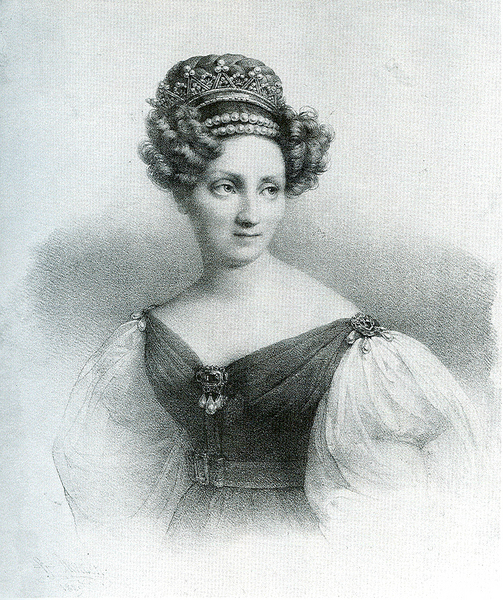by Scott Mehl © Unofficial Royalty 2017
Grand Duchy of Baden: In 1738, ten-year-old, Karl Friedrich succeeded as Margrave of Baden-Durlach upon his grandfather’s death. Baden-Durlach was one of the branches of the Margraviate of Baden, which had been divided several times over the previous 500 years. When August George, the last Margrave of Baden-Baden, died in 1771 without heirs, Karl Friedrich inherited the territory. This brought all of the Baden territories together once again, and Karl Friedrich became Margrave of Baden. Upon the end of the Holy Roman Empire, Karl Friedrich declared himself sovereign, as Grand Duke of the newly created Grand Duchy of Baden. Friedrich II, the last Grand Duke of Baden formally abdicated the throne of Baden on November 22, 1918. The land that encompassed the Grand Duchy of Baden is now located in the German state of Baden-Württemberg.
********************

Karl, Grand Duke of Baden – source: Wikipedia
Karl, Grand Duke of Baden, reigned from 1811 until 1818. He was born Karl Ludwig Friedrich at Karlsruhe Palace in Karlsruhe, Grand Duchy of Baden, now in Baden-Württemberg, Germany on July 8, 1786, the son of Karl Ludwig, Hereditary Prince of Baden and Amalie of Hesse-Darmstadt.
Karl had seven siblings:
- Amalie (1776-1823) – unmarried
- Karoline (1776- 1841) – married King Maximilian I Joseph of Bavaria, had issue
- Luise (1779-1826) – married Alexander I, Emperor of All Russia, had issue
- Friederike (1781-1826) – married King Gustav IV Adolf of Sweden, had issue
- Marie (1782-1808) – married Friedrich Wilhelm, Duke of Brunswick, had issue
- Karl Friedrich (1784-1785) – died in childhood
- Wilhelmine (1788-1836) – married Grand Duke Ludwig II of Hesse and by Rhine, had issue
Upon his father’s death in 1801, Karl became heir-apparent to his grandfather Karl Friedrich, Margrave of Baden. Over the next five years, Baden would become an Electorate and then a Grand Duchy in 1806.

Stéphanie de Beauharnais; Credit – Wikipedia
On April 8, 1806, Karl married Stéphanie de Beauharnais, the daughter of Claude de Beauharnais and Claudine Françoise de Lézay-Marnézia. She was also the adopted daughter of the French Emperor Napoléon I. Napoléon, wanting to secure an alliance with the Electorate of Baden, arranged for the marriage, despite neither Karl nor Stéphanie wanting to marry each other. For several years, the two lived separately, and it wasn’t until Karl’s grandfather was nearing death that they came together and began a family.
They had five children:
- Princess Luise Amelie (1811-1854) – married Gustav, Prince of Vasa, had issue
- unnamed son (1812) – died within weeks of birth
- Princess Josephine (1813-1900) – married Karl Anton of Hohenzollern-Sigmaringen, had issue including King Carol I of Romania
- Alexander, Hereditary Grand Duke of Baden (born and died 1816) – died within a week of birth
- Princess Marie (1817-1888) – married William Hamilton, 11th Duke of Hamilton, had issue including Lady Mary Victoria Hamilton who married Albert I, Prince of Monaco
Karl became Grand Duke upon his grandfather’s death in 1811. In 1817, with no living male heirs, and only one unmarried uncle to succeed him, Karl formally gave dynastic rights to his half-uncles – the sons of his grandfather from his second, morganatic, marriage. This kept the Grand Ducal throne of Baden from passing to Karl’s brother-in-law, the King of Bavaria. In 1818, Karl oversaw the passing of a new and much more liberal constitution.
Grand Duke Karl died at Schloss Rastatt in Rastatt, Grand Duchy of Baden, now in Baden-Württemberg, Germany, on December 8, 1818. He is buried in St. Michael’s Church in Pforzheim, Grand Duchy of Baden, now in Baden-Württemberg, Germany. As he had no male heirs, the throne of Baden passed to his uncle, Ludwig I. However, his descendants include the former Kings of Romania and Yugoslavia, the Belgian royal family, the Luxembourg grand ducal family, and the Monaco princely family.
This article is the intellectual property of Unofficial Royalty and is NOT TO BE COPIED, EDITED, OR POSTED IN ANY FORM ON ANOTHER WEBSITE under any circumstances. It is permissible to use a link that directs to Unofficial Royalty.
Baden Resources at Unofficial Royalty
